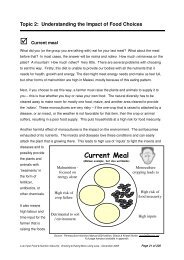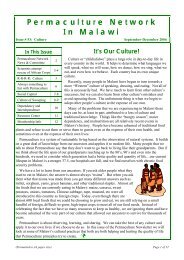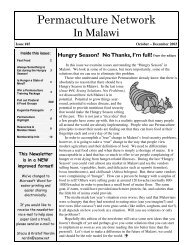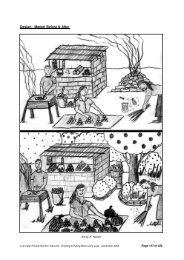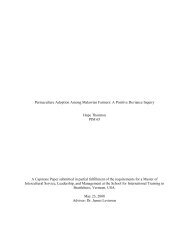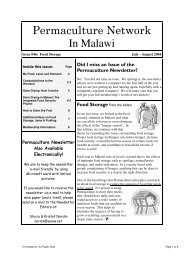Harmonisation of seed laws in Africa.indd - Never Ending Food
Harmonisation of seed laws in Africa.indd - Never Ending Food
Harmonisation of seed laws in Africa.indd - Never Ending Food
You also want an ePaper? Increase the reach of your titles
YUMPU automatically turns print PDFs into web optimized ePapers that Google loves.
GRICULTURE, ENERGY AND LIVELIHOOD SERIES<br />
appropriate plant variety protection (PVP) legislation, by tak<strong>in</strong>g <strong>in</strong>to account the <strong>Africa</strong>n Model Law<br />
for the Protection <strong>of</strong> the Rights <strong>of</strong> Local Communities, Farmers and Breeders and the International<br />
Treaty on Plant Genetic Resources for <strong>Food</strong> and Agriculture.<br />
Regrettably, this has not been the case. One by one, <strong>Africa</strong>n governments are be<strong>in</strong>g co-opted <strong>in</strong>to<br />
review<strong>in</strong>g their <strong>seed</strong> trade <strong>laws</strong> and support<strong>in</strong>g the implemention <strong>of</strong> PVP <strong>laws</strong> through fast-tracked<br />
regional harmonisation processes and trad<strong>in</strong>g blocs. The strategy is to first harmonise <strong>seed</strong> trade<br />
<strong>laws</strong> at the regional level, such as border control measures, phytosanitary control, variety release<br />
systems and certification standards, and then move on to harmonis<strong>in</strong>g PVP <strong>laws</strong>. The effect <strong>of</strong> these<br />
collective efforts is the creation <strong>of</strong> a bigger, unh<strong>in</strong>dered <strong>seed</strong> market, where the types <strong>of</strong> <strong>seed</strong>s on<br />
<strong>of</strong>fer are restricted to commercially protected varieties.<br />
Harmonised PVP <strong>laws</strong> <strong>in</strong> <strong>Africa</strong> are all based on the 1991 Act <strong>of</strong> the International Union for the<br />
Protection <strong>of</strong> Plant Varieties (UPOV) and these therefore go well beyond what TRIPs requires <strong>of</strong><br />
member countries. UPOV 1991 was developed by <strong>in</strong>dustrialised countries over 20 years ago to suit<br />
their own <strong>in</strong>terests. At its core is the strengthen<strong>in</strong>g <strong>of</strong> breeders’ rights and the underm<strong>in</strong><strong>in</strong>g and<br />
prejudic<strong>in</strong>g <strong>of</strong> farmers’ rights.<br />
Efforts towards the harmonisation <strong>of</strong> PVP policies and <strong>laws</strong> <strong>in</strong> <strong>Africa</strong> are characterised by high<br />
levels <strong>of</strong> political commitment and support, major fund<strong>in</strong>g and the conspicious absence <strong>of</strong> farmer<br />
participation.<br />
Additionally, the <strong>in</strong>ternational <strong>seed</strong> lobby has rapidly created a vast network <strong>of</strong> well-funded<br />
<strong>in</strong>itiatives, <strong>in</strong>stitutions and agreements rush<strong>in</strong>g <strong>Africa</strong>n governments <strong>in</strong>to adopt<strong>in</strong>g PVP <strong>laws</strong> based<br />
on UPOV 1991. The players that are <strong>in</strong>volved are numerous and <strong>in</strong>clude: <strong>Africa</strong>n regional trade blocs<br />
such as the Southern <strong>Africa</strong>n Development Community (SADC) and Common Market for East and<br />
Southern <strong>Africa</strong> (COMESA); <strong>in</strong>tellectual property agencies such as the <strong>Africa</strong>n Regional Intellectual<br />
Property Organisation (ARIPO); the World Bank; the United States Agency for International<br />
Development (USAID); Citizens Action for Foreign Affairs; the US patent and trademark <strong>of</strong>fice, the<br />
Seed Science Centre at Iowa State University; agrochemical/<strong>seed</strong> companies such as Monsanto,<br />
Syngenta, Pioneer Hi-Bred; <strong>seed</strong> associations such as the <strong>Africa</strong>n Seed Trade Association (AFSTA), the<br />
<strong>Food</strong> and Agriculture Organisation (FAO), public sector research <strong>in</strong>stitutions such as the Consultative<br />
Group on International Agricultural Research (CGIAR); the Alliance for a Green Revolution <strong>in</strong> <strong>Africa</strong><br />
(AGRA); and <strong>Africa</strong>n research <strong>in</strong>stitutions such as the Association for Strengthen<strong>in</strong>g Agricultural<br />
Research <strong>in</strong> Eastern and Central <strong>Africa</strong> (ASARECA) and the <strong>Food</strong>, Agriculture and Natural Resources<br />
Policy Analysis Network (FANRPAN).<br />
PVP harmonisation processes and their protaganists do not recognise the current practises <strong>of</strong> 80 per<br />
cent <strong>of</strong> <strong>Africa</strong>n farmers but <strong>in</strong>stead are set on underm<strong>in</strong><strong>in</strong>g and disregard<strong>in</strong>g the contribution these<br />
farmer-breeders have made, and are mak<strong>in</strong>g, to <strong>seed</strong> breed<strong>in</strong>g, genetic diversity and food security.<br />
Policies and <strong>laws</strong> based on UPOV 1991 will severely negatively impact on agricultural biodiversity,<br />
farmers and local communities, and consequently on food security. Furthermore, processes<br />
underway <strong>in</strong> develop<strong>in</strong>g harmonised legal frameworks that exclude civil society and farmer<br />
participation is a gross violation <strong>of</strong> human and customary rights <strong>of</strong> <strong>Africa</strong>n communities.<br />
<strong>Harmonisation</strong> <strong>of</strong> <strong>Africa</strong>’s <strong>seed</strong>s <strong>laws</strong>: a recipe for disaster 7



